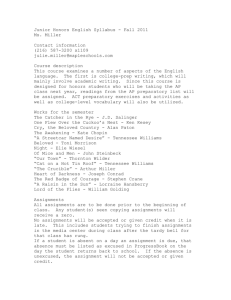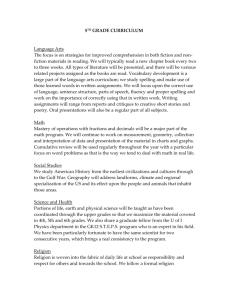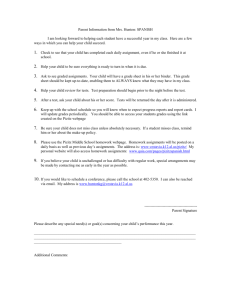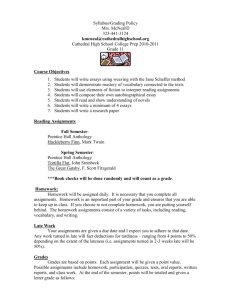introduction to economics
advertisement
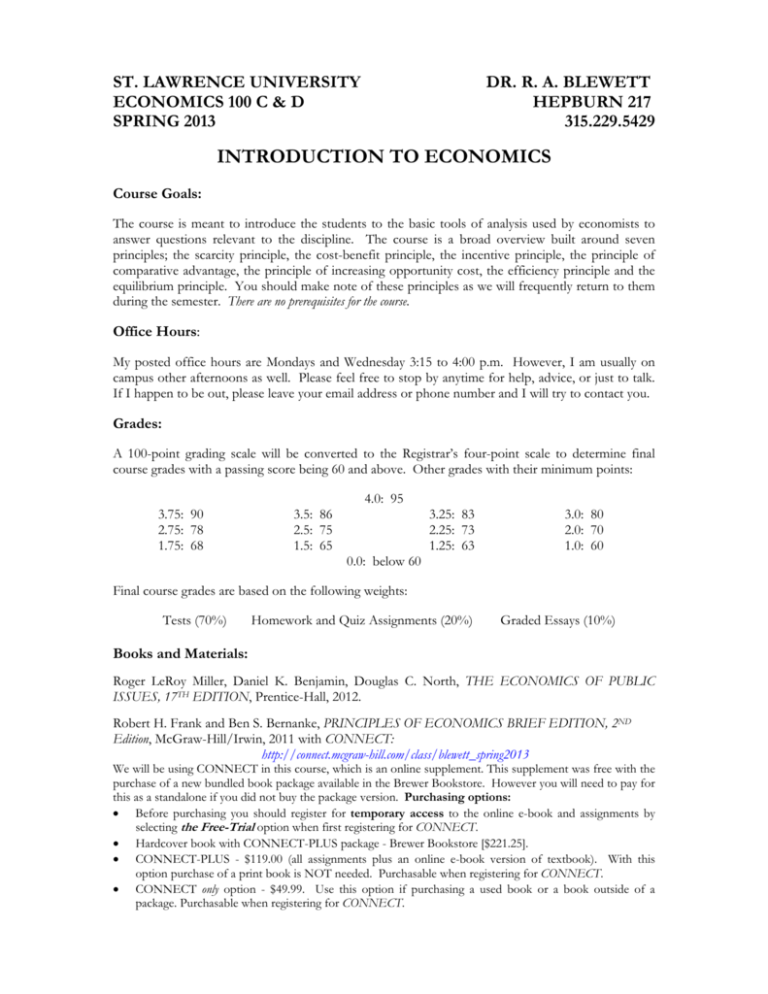
ST. LAWRENCE UNIVERSITY ECONOMICS 100 C & D SPRING 2013 DR. R. A. BLEWETT HEPBURN 217 315.229.5429 INTRODUCTION TO ECONOMICS Course Goals: The course is meant to introduce the students to the basic tools of analysis used by economists to answer questions relevant to the discipline. The course is a broad overview built around seven principles; the scarcity principle, the cost-benefit principle, the incentive principle, the principle of comparative advantage, the principle of increasing opportunity cost, the efficiency principle and the equilibrium principle. You should make note of these principles as we will frequently return to them during the semester. There are no prerequisites for the course. Office Hours: My posted office hours are Mondays and Wednesday 3:15 to 4:00 p.m. However, I am usually on campus other afternoons as well. Please feel free to stop by anytime for help, advice, or just to talk. If I happen to be out, please leave your email address or phone number and I will try to contact you. Grades: A 100-point grading scale will be converted to the Registrar’s four-point scale to determine final course grades with a passing score being 60 and above. Other grades with their minimum points: 4.0: 95 3.75: 90 2.75: 78 1.75: 68 3.5: 86 2.5: 75 1.5: 65 3.25: 83 2.25: 73 1.25: 63 3.0: 80 2.0: 70 1.0: 60 0.0: below 60 Final course grades are based on the following weights: Tests (70%) Homework and Quiz Assignments (20%) Graded Essays (10%) Books and Materials: Roger LeRoy Miller, Daniel K. Benjamin, Douglas C. North, THE ECONOMICS OF PUBLIC ISSUES, 17TH EDITION, Prentice-Hall, 2012. Robert H. Frank and Ben S. Bernanke, PRINCIPLES OF ECONOMICS BRIEF EDITION, 2ND Edition, McGraw-Hill/Irwin, 2011 with CONNECT: http://connect.mcgraw-hill.com/class/blewett_spring2013 We will be using CONNECT in this course, which is an online supplement. This supplement was free with the purchase of a new bundled book package available in the Brewer Bookstore. However you will need to pay for this as a standalone if you did not buy the package version. Purchasing options: Before purchasing you should register for temporary access to the online e-book and assignments by selecting the Free-Trial option when first registering for CONNECT. Hardcover book with CONNECT-PLUS package - Brewer Bookstore [$221.25]. CONNECT-PLUS - $119.00 (all assignments plus an online e-book version of textbook). With this option purchase of a print book is NOT needed. Purchasable when registering for CONNECT. CONNECT only option - $49.99. Use this option if purchasing a used book or a book outside of a package. Purchasable when registering for CONNECT. Syllabus for Economics 100 C & D, Spring 2013, Page 2 of 4 Why is Connect Important? You’ll be required to submit graded quizzes and assignments through CONNECT. CONNECT provides instant feedback on scores and helps students learn to solve the assignments. CONNECT includes free student study tools. CONNECT -PLUS includes an integrated online e-book. (Note: CONNECT-PLUS is included for free in all NEW packages in the bookstore). Registration. To register and/or purchase access to CONNECT, go to the specific website for this course: http://connect.mcgraw-hill.com/class/blewett_spring2013 Click on the Register Now button. (There is also a video on the left hand side to help answer any questions you may have when registering if you have a code or if you need to buy one). Put in your email address. If you have registered with McGraw-Hill previously they will recognize you in their system so you can use your old password that you had previously had with them. If you have the access code you can enter this on the left hand side to redeem this. (This can only be redeemed once and must be the code for the required book we are using.) If you need to purchase an access code then click to purchase on the right hand side. You will have two different purchasing options. You can either just purchase access to CONNECT only which is $49.99, or if you have not purchased a book yet, you can choose to purchase for $119.00 the CONNECT-PLUS version which is a full e-book version of the book we will be using. With the CONNECT-PLUS version (which is also included in the package in the bookstore), you do not need a hard copy of the book if you don’t want one. At this page you can also select the free 21-day trial (highly recommended). Assistance. If you have any questions regarding CONNECT do not contact the instructor. Please direct questions to McGraw-Hill tech support, either by visiting their website at: www.mhhe.com/support for helpful FAQ’s, or by calling 800-331-5094. If you do contact McGraw-Hill with a question please write down the case number they will give you. They are open Monday Thursday 9am to Midnight, Fridays 9am to7pm, as well as Sundays 7pm to Midnight, if you have any questions. You will be responsible for following up with them to make sure that you complete the required homework assignment on time. Assignment Due Dates. There can be no late assignments. Each assignment has a firm deadline. There can be no adjustments after a deadline so be sure to start and finish assignments well before the time due. Any assignment not completed will be scored according to what was submitted even if there were reasons for the incomplete assignment that were beyond your control. Free Passes and Extra Credit. Due to the unforgiving nature of the due dates for CONNECT assignments, each student will have two free passes. A free pass means that an assignment will be dropped and not counted. There will also be opportunities for extra credit that can be used for additional free passes. The lowest scores will be dropped automatically. Using Safari as a Browser? If you have problems downloading, uploading, or entering information you might try switching to another browser when using CONNECT. Syllabus for Economics 100 C & D, Spring 2013, Page 3 of 4 Evaluation Policies: Tests (70%) Our four tests will be comprised of multiple choice questions, short answer questions, essays and problems. The first two tests will cover microeconomics. The second test is comprehensive, covering material from the first half of the semester. The third and fourth tests covers macroeconomics with the fourth test being comprehensive, covering material from the last half of the semester. The first and third tests will each be 20% of the final course grade and the comprehensive second and fourth tests will each be 25%. Notice that those percentages add up to 90% rather than 70%. However if test #1 or #3 is the lowest or the four tests, that test score, worth 20%, will be dropped and not counted. If either test #2 or #4 is the lowest of the four, that test will count only 5% rather than 25% of the final course grade. This will get the 90% down to 70%. Students may take any test early but no late tests will be given. Any test missed will receive a score of zero. Attendance is required at Tests #2 and #4. Homework & Quiz Assignments (20%) The analytical nature of economics makes homework assignments important active learning devices. Assignments will be given out regularly during the semester, mostly via CONNECT. Quizzes may be given unannounced. However, most quizzes will be assigned online through CONNECT. Any assignment missed will receive a score of zero. All assignments will have equal weight in determining grades. There will be no late assignments accepted. Graded Essays (10%) Two short essays designed to foster your skills applying economic concepts will be assigned (“Economic Naturalist” and “It’s a Wonderful Life”). Specifics for each assignment will be posted on CONNECT. Both essays involve using economic concepts to try to understand subjects outside of academic settings. These assignments will involve no research but are merely opportunities to apply concepts studied in class. Other Course Policies: (a) Email Notices. Students are responsible for notices sent to their campus email address as well as announcements and other information provided on CONNECT. (b) Class Attendance. Students missing class are responsible for all material covered but attendance is not required. However, attendance will be recorded. (c) Electronic Devices. Cell phones, pagers, i-pods, and other electronic devices are to be turned off during class and exams. (d) Calculators. Non-programmable calculators may be used during tests but may not be shared with other students. (e) Special Accommodations. Special Needs students should submit IEAP’s before the end of the second week of classes. (f) Sleepy? Students having trouble staying awake during class are free to stand at the back or the side of the room. (g) Final Exam. Test #4 is given during final exam week on Tuesday evening, December 18th at 6 p.m. A separate, comprehensive multiple choice test covering material from the entire course, will also be given. This comprehensive test cannot lower student final course grades. However, students who do well will receive extra credit toward their final course grade. (h) Borderline Grades. Final course grades “on the bubble” are resolved on the basis of factors such as performance on the comprehensive final exam, class attendance, improvement during the course, class participation, and attitude toward learning. Syllabus for Economics 100 C & D, Spring 2013, Page 4 of 4 Tentative Course Outline F&B refers to our textbook by Frank & Bernanke while Miller refers to the smaller paperback book. Microeconomics A. The Basics 1. Thinking Like an Economist [F&B Chapter 1; Miller Chapters 1, 2, 4] 2. Comparative Advantage [F&B Chapter 2; Miller Chapters 28, 29] 3. Supply and Demand [F&B Chapter 3; Miller Chapters 6, 7, 10] 4. Consumer/Producer Surplus and Elasticity [F&B Chapter 4] B. Going Deeper into Analyzing Markets 1. Perfectly Competitive Supply [F&B Chapter 5; Miller Chapter 26] 2. Exchange and the Invisible Hand [F&B Chapter 6; Miller Chapters 18, 19] 3. Monopoly and Imperfect Markets [F&B Chapter 7; Miller Chapters 16, 17] 4. Games and Strategic Behavior [F&B Chapter 8; Miller Chapter 24; F&B: Economic Naturalist 9.5 (Steroids), pp. 271-273; F&B: Mandatory Immunization, p.284; F&B: International Environmental Pollution, bottom of p. 270] Macroeconomics C. Macroeconomics – Data and Issues 1. Spending/Income/and/GDP [F&B Chapter 11; Miller Chapter 14] 2. Inflation and the Price Level [F&B Chapter 12] 3. Wages and Unemployment [F&B Chapter 13; Miller Chapters 12, 13] D. The Long Run 1. Economic Growth [F&B Chapter 14; Miller Chapter 5, 30] 2. Saving/Capital Formation/Financial Markets [F&B Chapter 15; Miller Chapter 23] 3. Money/Prices/Financial System [F&B Chapter 16, pp. 539-544; Miller Chapter 21] E. The Short Run 1. Short-Term Economic Fluctuations [F&B Chapter 17] 2. AD/AS Analysis and Stabilization Policy [F&B Chapter 20] 3. Monetary and Fiscal Policy [F&B pp. 530-33, 544-46] Tentative Course Schedule: First Day of Class – Monday 21 January Essay #1 due – Monday 8 April Last Day to Add/Drop – Tuesday 29 January Last Day to W/D – Friday 5 April Test #1 – Monday 11 February Test #3 – Friday 12 April Last Day P/F Petition – Friday 22 February Essay #2 due – Monday 29 April Test #2 – Friday 8 March Last Day of Class – Friday 3 May Mid-Semester Break – 9 March to 17 March Test #4 – Wednesday 6 May at 6 p.m.

